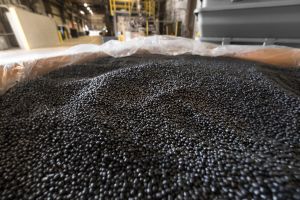
Why Manufacturers Are Seeking Alternatives to Virgin Resin
Manufacturers are increasingly turning their attention to alternatives to virgin resin due to several compelling reasons. Let’s explore these motivations:
1. Environmental Responsibility
The primary driver behind the shift away from virgin resin is a growing commitment to environmental responsibility. Virgin resin is created from raw fossil fuel materials, which, when extracted and processed, contribute to greenhouse gas emissions and the depletion of natural resources. These environmental concerns are driving manufacturers to seek more sustainable options.
2. Cost Efficiency
Another significant reason manufacturers are looking for alternatives is cost efficiency. Utilizing recycled resin can often be more cost-effective than virgin resin, as it reduces the need for expensive extraction and refining processes. This cost-saving potential is a significant incentive for businesses, making recycled resin an appealing choice.
3. Regulatory Compliance
Increasingly stringent environmental regulations and legislation have prompted manufacturers to explore alternatives to virgin resin. Governments around the world are implementing regulations that aim to reduce single-use plastics and promote recycling. Companies that adapt to these regulations not only ensure compliance but also improve their reputation.
What Is Recycled Resin?
Recycled resin, as the name suggests, is plastic resin that is derived from post-consumer or post-industrial waste. It is produced by collecting and processing used plastic products, such as bottles, containers, or industrial scraps, and then converting them into new plastic materials. The process involves several steps:
1. Collection
The first step in recycling plastic is the collection of used plastic items. This can involve consumers recycling their products through municipal programs or businesses collecting and sending their industrial waste to recycling facilities.
2. Sorting and Cleaning
Once collected, the plastic items go through a sorting process. They are categorized by type and cleaned to remove any impurities, such as labels or contaminants.
3. Shredding
After sorting and cleaning, the plastic is shredded into small pieces. These pieces are known as “flakes” and serve as the basis for creating recycled resin.
4. Melting and Extrusion
The plastic flakes are then melted and extruded into pellets, which are the final form of recycled resin. These pellets can be used in various manufacturing processes to create a wide range of plastic products.
The Benefits of Recycled Resin
The utilization of recycled resin offers a host of benefits, both for manufacturers and the environment. Let’s explore some of the advantages that make recycled resin an attractive alternative to virgin resin:
1. Reduced Environmental Impact
One of the most significant advantages of recycled resin is its reduced environmental impact. Using recycled plastic helps divert waste from landfills and reduces the need for the extraction of new fossil fuels. This helps decrease greenhouse gas emissions and conserves precious natural resources.
2. Energy Savings
The production of recycled resin consumes significantly less energy compared to the creation of virgin resin. The energy savings in the recycling process translate into lower manufacturing costs and a reduced carbon footprint.
3. Improved Reputation
Companies that embrace recycled resin and eco-friendly practices are often seen as more responsible and forward-thinking. This can lead to an improved brand reputation and a stronger appeal to environmentally conscious consumers.
4. Cost Efficiency
As mentioned earlier, recycled resin can be a cost-effective alternative to virgin resin. By reducing the need for expensive extraction and refining processes, manufacturers can achieve cost savings without compromising on product quality.
5. Diverse Applications
Recycled resin is a versatile material that can be used in a wide range of applications. From packaging materials to construction products, recycled resin can meet the requirements of various industries.
6. Regulatory Compliance
With governments worldwide implementing stricter regulations on plastic use and waste management, using recycled resin can help manufacturers remain in compliance with these evolving laws.
7. Sustainable Supply Chain
By incorporating recycled resin into their supply chain, manufacturers contribute to a more sustainable and circular economy. This approach aligns with the principles of the circular economy, where resources are reused, and waste is minimized.
Shift Towards Alternatives to Virgin Resin With Us
The shift towards alternatives to virgin resin, particularly recycled resin, is driven by a combination of environmental, economic, and regulatory factors. The use of recycled resin not only reduces the environmental impact of manufacturing but also offers cost savings and regulatory compliance benefits.
At CTC Plastics, we are committed to providing sustainable and eco-friendly plastic solutions. Our range of recycled resin products reflects our dedication to responsible manufacturing practices. Contact us today to learn more about how our recycled resin products can benefit your business.

